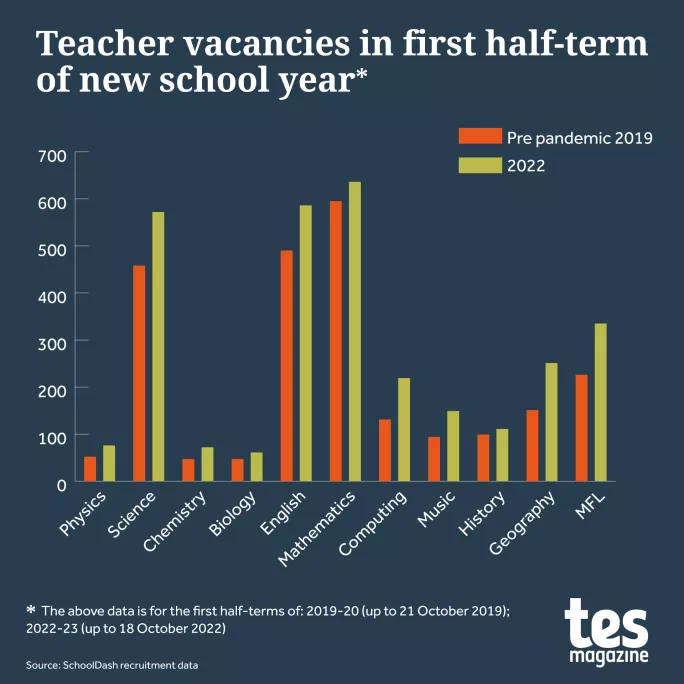Revealed: Soaring teacher vacancies impact on schools

Soaring teacher vacancies are having a “dire” and “severe” impact on schools, leaders have warned as Tes analysis reveals the number of vacancies for teachers or leaders is up by 67 per cent in some subjects compared with pre-pandemic levels.
Computing, geography, music and chemistry are the worst hit subjects, with vacancy levels for these subjects up by over 50 per cent in autumn half-term this year, compared with the same period in the 2019-20 academic year, according to vacancies data collected by SchoolDash and analysed by Tes.
The vacancies analysed by Tes included subject teachers and leaders in schools across England.
- Exclusive: Teacher vacancies rise by almost two-thirds in September
- Teacher training: DfE raises teacher training bursaries amid recruitment crisis
- Teacher recruitment: Secondary teacher trainees 40 per cent below government target

Vacancies for computing teachers and subject leaders was up by almost 70 per cent in the 2022-23 autumn half-term, compared with the same period in 2019, the data showed.
And geography vacancies were also two-thirds higher compared with 2019.
Meanwhile, there was a 53 per cent higher level of vacancies for chemistry teacher and leaders so far this term compared with the same period in 2019.
And vacancies for music teachers and leaders was also more up by more than half (59 per cent) this year.
Vacancies reveal teacher recruitment problems
Alan Kinder, chief executive of the Geographical Association, said that the organisation had been warning of future recruitment problems in the subject since 2015, saying that “there were some severe problems that lay ahead”.
He said those “problems appear to have come to pass, unfortunately”.
Mr Kinder said the current problems were due to issues at either end of the supply pipeline, in terms of recruitment and retention.
He added there had been a “persistent pattern of under-recruitment into initial teacher education” for the subject.
Just 67 per cent of the target set by the Department for Education for the number of geography trainees started courses in September.
Mr Kinder also said there had been a problem of “masked under-recruitment” over the past two decades, with headteachers feeling they were “in a position to use other non-specialists in teaching the subject”.
As a result, Mr Kinder said the issue of vacancies in the humanities subject may not have received much attention.
This year the DfE announced that the bursary for geography trainee teachers would increase in 2023-24 from £15,000 to £25,000.
But, in terms of tackling the shortage of teachers, Mr Kinder said he thought there was “more to it” than simply raising a bursary.
He said that over the past 10 years he had seen bursaries “being increased or decreased again and so forth, and lying behind that there’s a real problem”.
“And the problem is that the DfE’s teacher supply model is what I would call a stock replenishment type of approach,” Mr Kinder said, which “really ignores some of the longer term and bigger issues at play”.
Vacancies ‘worse across every subject’
Vic Goddard, principal at Passmores Academy in Essex, said it is “important to realise”, when looking at the vacancy data, that the starting point in 2019 was “awful”, and the figures are now “worse across every subject”.
He said the “compromise” that schools are already making is to “look at the subjects where they can recruit and seeing which staff can teach an English Baccalaureate subject as well (because of an A level or simply an interest) and then recruiting to cover them”.
Mr Goddard added that while some of these teachers will do a “great job”, it is not the “best option”.
He said that recruitment in areas near big cities like London was “difficult already”. But if you “multiply that by the impact of teaching in a deprived area, then multiply it again by the fact that the government fails to recruit enough graduates in the first place, the situation is dire”.
Concerns have also been raised about a drop in the supply of music teachers after the number of music trainees recruited to courses for the 2022-23 academic year was just 61 per cent of the target set by the DfE in April.
“The DfE’s teacher supply model ”ignores some of the longer term and bigger issues at play”
The number of vacancies in music rose by nearly 60 per cent this year compared with 2019, and the subject was not assigned a bursary for the 2023-24 ITT cohort.
One headteacher, who wished to remain anonymous, said they had not been able to recruit in religious education and, as a result, did not have it as a “standalone subject in the curriculum”.
And Glyn Potts, headteacher of Newman Catholic College in Greater Manchester, has similar concerns.
Mr Potts said four schools in his area advertised for a French teacher and only had two applicants between them, with those both coming from the same individual.
One of the solutions for under-recruitment is to have other qualified teachers outside of a subject delivering it, Mr Potts said. But he added that this “represents a risk” because in the Ofsted Handbook it says “inspectors will target those teachers to see what support is on offer”.
He said he was putting his history teacher through a subject enhancement course, as they are having to also teach geography.
And low recruitment is also impacting on the government’s EBacc targets: a report earlier this year described the targets as “done for”.
Earlier this month DfE data for 2022 revealed that 38.7 per cent of students were entered into the full EBacc, a decrease of 1.3 percentage points compared with 2019.
And Mr Potts said that his school would not be able to achieve a higher percentage of pupils doing the EBacc because he “can’t get the teachers”.
Mr Goddard said the target of 90 per cent of students completing the EBacc by 2025 was “ludicrous”, given problems with teacher supply.
He added that the DfE “obviously didn’t work out how many additional teachers would be required in those subjects to keep class sizes manageable, and how to ensure they go where they are needed most”.
Low numbers of trainee teachers
While the government recently said schools in newly defined Education Investment Areas would receive a package of extra support, including retention payments for teachers in the highest-priority subjects, as part of its “levelling up” efforts, Mr Potts said many of the candidates for vacancies are saying they’re “just not enough”.
Nick Goforth, a headteacher in the Midlands, told Tes that while he isn’t seeing a problem with recruitment of more experienced teachers, the shortfall for his school lies in the recruitment of newly qualified teachers.
He said that while the school is “doing OK at the moment taking experienced staff”, that “isn’t going to last forever”.
Earlier this month government figures revealed that it had missed its target for secondary teacher trainee numbers by 40 per cent.
Furthermore, the number of secondary trainees accepted on to courses starting last month was 23 per cent below pre-pandemic levels.
Last month Tes revealed that teacher vacancies had risen by almost two-thirds in September compared with pre-pandemic levels.
You need a Tes subscription to read this article
Subscribe now to read this article and get other subscriber-only content:
- Unlimited access to all Tes magazine content
- Exclusive subscriber-only stories
- Award-winning email newsletters
Already a subscriber? Log in
You need a subscription to read this article
Subscribe now to read this article and get other subscriber-only content, including:
- Unlimited access to all Tes magazine content
- Exclusive subscriber-only stories
- Award-winning email newsletters
topics in this article



